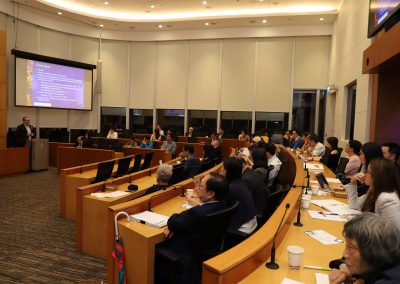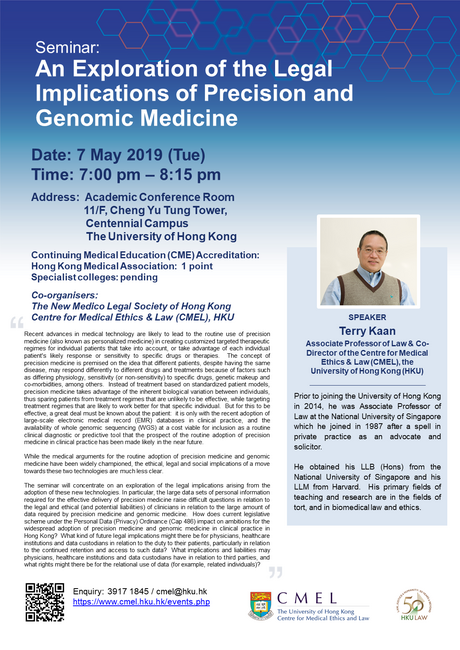This event is co-organized by The New Medico Legal Society of Hong Kong and the Centre for Medical Ethics & Law (CMEL) of the University of Hong Kong.
Speaker:
Terry Kaan
Associate Professor of Law & Co-Director of the Centre for Medical Ethics & Law (CMEL), the University of Hong Kong (HKU)
Seminar Details:
Recent advances in medical technology are likely to lead to the routine use of precision medicine (also known as personalized medicine) in creating customized targeted therapeutic regimes for individual patients that take into account, or take advantage of each individual patient’s likely response or sensitivity to specific drugs or therapies. The concept of precision medicine is premised on the idea that different patients, despite having the same disease, may respond differently to different drugs and treatments because of factors such as differing physiology, sensitivity (or non-sensitivity) to specific drugs, genetic makeup and co-morbidities, among others. Instead of treatment based on standardized patient models, precision medicine takes advantage of the inherent biological variation between individuals, thus sparing patients from treatment regimes that are unlikely to be effective, while targeting treatment regimes that are likely to work better for that specific individual. But for this to be effective, a great deal must be known about the patient: it is only with the recent adoption of large-scale electronic medical record (EMR) databases in clinical practice, and the availability of whole genomic sequencing (WGS) at a cost viable for inclusion as a routine clinical diagnostic or predictive tool that the prospect of the routine adoption of precision medicine in clinical practice has been made likely in the near future.
While the medical arguments for the routine adoption of precision medicine and genomic medicine have been widely championed, the ethical, legal and social implications of a move towards these two technologies are much less clear.
The seminar will concentrate on an exploration of the legal implications arising from the adoption of these new technologies. In particular, the large data sets of personal information required for the effective delivery of precision medicine raise difficult questions in relation to the legal and ethical (and potential liabilities) of clinicians in relation to the large amount of data required by precision medicine and genomic medicine. How does current legislative scheme under the Personal Data (Privacy) Ordinance (Cap 486) impact on ambitions for the widespread adoption of precision medicine and genomic medicine in clinical practice in Hong Kong? What kind of future legal implications might there be for physicians, healthcare institutions and data custodians in relation to the duty to their patients, particularly in relation to the continued retention and access to such data? What implications and liabilities may physicians, healthcare institutions and data custodians have in relation to third parties, and what rights might there be for the relational use of data (for example, related individuals)?
Continuing Medical Education (CME) Accreditation:
Click here
PowerPoint Slides:
Click here




